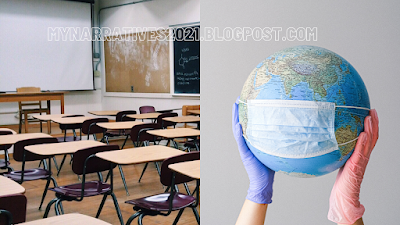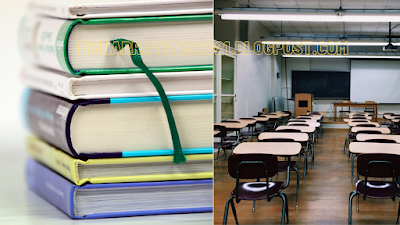Educational Loss Due To COVID19
School terminations because of COVID-19 have carried critical disturbances to education across the globe. Arising proof from various countries demonstrates that the pandemic is leading to learning misfortunes and expansions in imbalance.
To decrease and converse the drawn-out adverse consequences, states which are probably going to be much harder hit, need to execute learning recuperation programs, ensure instructive spending plans, and get ready for future shocks by "working back better."
At the pinnacle of the pandemic, 45 nations in Europe and Central Asia shut their schools, influencing 185 million students. Given the unexpectedness of the circumstance, instructors and organizations were caught off guard for this progress and had to assemble crisis remote learning frameworks very quickly.
One of the impediments of crisis remote learning is the absence of individual communication among instructors and students. With broadcasts, this is basically impractical. But, a few nations demonstrated energy by utilizing different techniques to work on the far-off instructive experience, including web-based media, email, phone, and surprisingly the post office.
Pakistan likewise executed measures to help remote learning and getting the hang of, beginning with broadcasting video lectures through TV and utilizing on the web distance learning stages.
Institutions organized web-based proficient turn of events and distributed learning openings for instructors to meet distantly and offer encounters with the internet getting the hang of during the COVID-19 emergency.
Lamentably, regardless of best endeavors to set up a steady remote learning experience, the proof is arising to show that school terminations have brought about real learning misfortunes. Studies examining these results are progressing, however early outcomes from different countries demonstrate both learning misfortunes and expansions in disparity.
Alarmingly, these misfortunes are observed to be a lot higher among students whose guardians have less educated, a finding built up by a review showing that youngsters from financially advantaged families have gotten more parental help with their studies during the school closure period.
These arising information, which give experiences into the world’s most elevated income nations, can likewise be utilized to anticipate results in middle income nations. In spite of their considerable mechanical capacity, even Europe's highest income nations have encountered learning misfortunes and expanded disparity because of the sudden change to virtual learning.
These results are probably going to be considerably more intense in middle and lower-income nations, where there is substantially less mechanical capacity and a bigger portion of families live underneath the destitution line.
Outside the classroom, learning misfortunes might convert into significantly more prominent long-haul difficulties. It has for quite some time been realized that reductions in test scores are related to future decreases in business. Alternately, expansions in student accomplishment lead to huge expansions in future pay, as do extra-long stretches of tutoring, which are related to an 8–9% gain in lifetime earnings. Without a trace of intercession, the learning misfortunes emerging from the COVID-19 pandemic are probably going to have a drawn-out intensifying adverse consequence on many youngsters' future prosperity. These learning misfortunes could make an interpretation of less admittance to advanced education, lower work market cooperation, and lower future profit.
To alleviate these difficulties while additionally fabricating a stronger framework that can withstand future emergencies, we make three center proposals for different nations around the world: executing learning recuperation programs, securing education budgets, and planning for future shocks.
1. Execute learning recuperation programs.
Most quickly, legislatures should guarantee that students who have fallen behind get the help that they need to get up to speed to anticipated learning targets. The initial step should be to complete in the nick of time evaluations to distinguish these students and their help needs.
Exploration has shown that 12-week projects of coaching can assist students with gaining the sort of headway that would be relied upon from three to five months of ordinary tutoring.
2. Protect the education budget.
Given the critical monetary strain that economies have been under during the pandemic, a few nations might confront government spending plan cuts that could endanger the increases that have been made lately as far as access to education and further developed learning results.
To guarantee a tough recuperation, it is fundamental that the education budget plan should be ensured and that the schools that need financing the most are upheld. To help the weakest students, states ought to focus on coordinating a significant part of the financing and assets to help schools conveying distant guidance, especially if those schools are serving high-neediness and high-minority populaces.
To urge students to stay in school, motivating forces, for example, grants might be carried out. However, learning recuperation projects won't be attainable without considerable monetary help. Within the sight of spending plan cuts, wealthy families will actually want to keep on subsidizing educational boosts like mentoring; however, lower-income families cannot as effectively fill this hole.
3. Plan for future shocks by working back better
It is basic that we recuperate from the pandemic as well as that we utilize this experience to turn out to be more ready for future emergencies. To help this point, nations need to construct their ability to give mixed models of education later on. Schools ought to be more ready to switch effectively between eye to eye and remote learning depending on the situation. This will secure the education of students during future pandemics, yet additionally during different shocks that may cause school terminations, like cataclysmic events or antagonistic climate occasions. It will likewise set out open doors for more individualized ways to deal with educating and learning.
In view of this, it will be important to foster adaptable educational plans that can be instructed face to face or on the web. Moreover, instructors should be better prepared to deal with a wide scope of IT gadgets in case of future school terminations.
Offering short instructional classes to further develop their computerized abilities will help. Utilizing the post-pandemic time frame to remake schooling frameworks and focus on them versatile. Simultaneously, fabricate a future schooling framework that can utilize mixed learning models to arrive at all students at their level and to give more individualized ways to deal with educating.
Conclusion
Albeit this is a drawn-out measure, Pakistan is now making strides around here. The specialists have created guidelines for distance training, and endeavors are continuous to keep on growing the number of schools with web availability and access to advanced gadgets and gear to consider more prominent utilization of mixed learning approaches in schools going ahead. All things being equal, "working back better" requires strong activity and a dream for the sort of human resources Pakistan should develop and thrive.








No comments:
Post a Comment